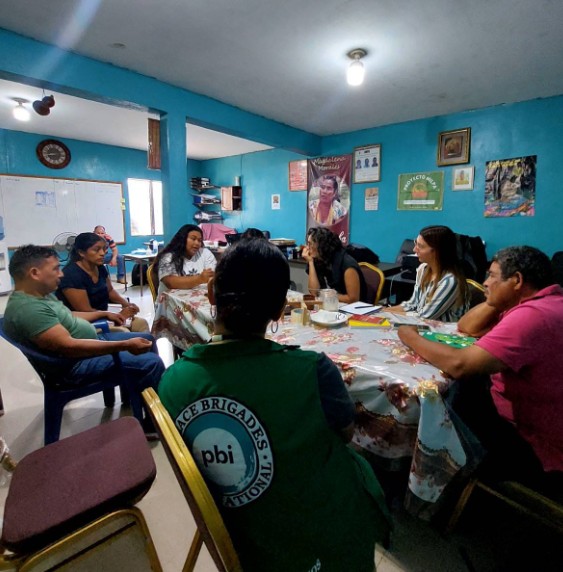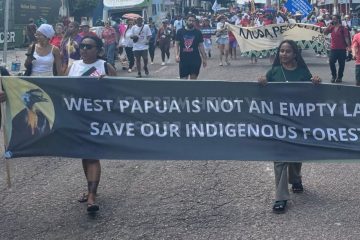PBI-Honduras accompanies the National Union of Rural Workers (CNTC) at meeting with the French Embassy

On June 17, PBI-Honduras posted:
“Yesterday, PBI accompanied the CNTC [National Union of Rural Workers] El Progreso in a meeting with the French Embassy in Honduras and French journalist Alice Campaignolle. The CNTC expressed its concern about evictions and the criminalization of peasant communities. Agrarian reform was also discussed. PBI and the French Embassy highlighted the important role that women defenders play in defending land and territory in Honduras.”

The need for agrarian reform
Reuters has reported: “Less than 5% of Honduras’ landowners, government figures show, control 60% of the fertile terrain, including many monocultures of palm and other export crops.” PBI-Honduras has also previously highlighted: “Despite their fundamental role in food production, 90% of rural women do not have land.”
Organized agricultural workers killed
In April 2024, Ojalá (a digital weekly co-founded by Canadian journalist Dawn Marie Paley) reported: “Over the last 15 years, private and state security forces have killed at least 180 organized agricultural workers. More recently, semi-autonomous assassins and paramilitary groups became increasingly important. Some of these have documented ties to private security operatives known to have worked for palm corporations, as well as to military officers.”
Attacks against the CNTC
In January 2023, Abelino Sánchez, regional secretary of the National Union of Rural Workers (CNTC) and president of a peasant cooperative in the department of Cortés, was seriously injured after being shot twice by two men who came to his house. He had received death threats related to a land conflict.
In June 2024, PBI-Honduras tweeted about the risks experienced by members of the CNTC: “We are concerned about the situation of threats, surveillance, attacks and criminalization against the people of the organization and its bases.”
Then in August 2024, CNTC member Olman Garcia was murdered. At that time, PBI-Honduras stated: “We recognize the important and courageous advocacy work that Olman carried out to promote access to land and land tenure for small farmers in Honduras. His murder highlights the risks that land defenders continue to face in the country.”
France, Canada abstain at UN vote on the rights of peasants
On December 17, 2018, the United Nations General Assembly voted in favour of the ‘Declaration on the Rights of Peasants and Other Persons Working in Rural Areas’.
French academic Chloé Maurel has commented: “The declaration was adopted by 121 votes in favour, eight against and 54 abstentions. Not surprisingly, the countries of the North, such as the United States and France, did not vote for the declaration, being exporters of seeds and phytosanitary products and having close ties with the interests of the large multinational agribusiness firms.”
At this time, we recall that Canada also abstained in that December 2018 on the Declaration.
PBI-Honduras has noted that this UN Declaration recognizes key elements such as “the right to land, to natural resources and to food sovereignty, based on the principle of equality between men and women.”
The CNTC and the labour movement
The CNTC, created in 1985, is a small-scale farming and trade union organization that fights for the distribution of land.
PBI-Honduras has highlighted: “The lack of land titles remains a systemic issue that characterises these processes. Of the 404 communities that form the CNTC, just 20 per cent have titles to their lands. Many others have worked and lived on their lands for three or four decades, and have spent 15 years awaiting the official recognition of their rights that never seems to arrive.”
The CNTC is affiliated with the Unified Confederation of Honduran Workers (CUTH) which in turn is affiliated with the International Trade Union Confederation (ITUC), along with 150+ labour organizations including the Canadian Labour Congress.
Peace Brigades International has been accompanying the CNTC since May 2018.



0 Comments